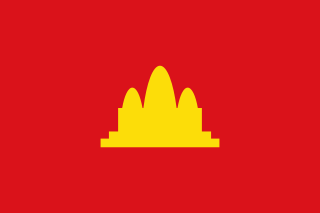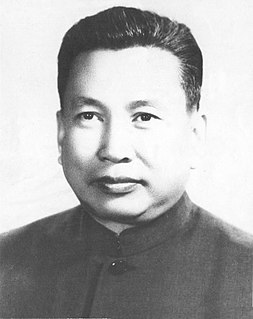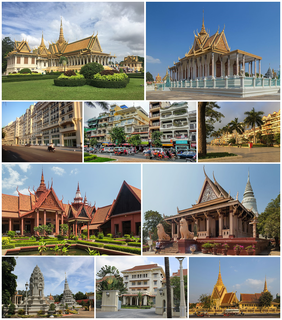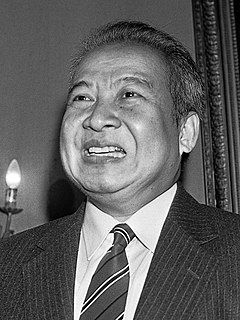The history of Cambodia, a country in mainland Southeast Asia, can be traced back to Indian civilization. Detailed records of a political structure on the territory of what is now Cambodia first appear in Chinese annals in reference to Funan, a polity that encompassed the southernmost part of the Indochinese peninsula during the 1st to 6th centuries. Centered at the lower Mekong, Funan is noted as the oldest regional Hindu culture, which suggests prolonged socio-economic interaction with maritime trading partners of the Indosphere in the west. By the 6th century a civilization, called Chenla or Zhenla in Chinese annals, firmly replaced Funan, as it controlled larger, more undulating areas of Indochina and maintained more than a singular centre of power.

The Khmer Rouge is the name that was popularly given to members of the Communist Party of Kampuchea (CPK) and by extension to the regime through which the CPK ruled Cambodia between 1975 and 1979. The name was coined in the 1960s by then Prime Minister Norodom Sihanouk to describe his country's heterogeneous, communist-led dissidents, with whom he allied after his 1970 overthrow.

Pol Pot was a Cambodian revolutionary and politician who governed Cambodia as Prime Minister of Democratic Kampuchea between 1976 and 1979. Ideologically a Marxist–Leninist and a Khmer nationalist, he was a leading member of Cambodia's communist movement, the Khmer Rouge, from 1963 until 1997 and served as the General Secretary of the Communist Party of Kampuchea from 1963 to 1981. Under his administration, Cambodia was converted into a one-party communist state and went through the events of the Cambodian genocide.

Phnom Penh is the capital and most populous city of Cambodia. It has been the national capital since the French protectorate of Cambodia, and has grown to become the nation's economic, industrial, and cultural centre.

Norodom Sihanouk was a Cambodian statesman and royal who led Cambodia in various capacities throughout his long career, most often as both King and Prime Minister of Cambodia. In Cambodia, he is known as Samdech Euv. During his lifetime, Cambodia was variously called the French protectorate of Cambodia, the Kingdom of Cambodia (1953–1970), the Khmer Republic (1970–75), Democratic Kampuchea (1975–79), the People's Republic of Kampuchea (1979–93), and again the Kingdom of Cambodia.

Angkor Wat is a temple complex in northwest Cambodia. A national symbol and sacred site of Cambodian Buddhism, the complex is a UNESCO World Heritage Site and a significant tourist destination.

Cambodia, officially the Kingdom of Cambodia, is a country located in the southern portion of the Indochinese Peninsula in Southeast Asia. It is 181,035 square kilometres in area, bordered by Thailand to the northwest, Laos to the north, Vietnam to the east, the Gulf of Thailand to the southwest, and maritime borders with Thailand, Malaysia and Indonesia. Phnom Penh is the nation's capital and largest city.

The Cambodian Civil War was a civil war in Cambodia fought between the forces of the Communist Party of Kampuchea against the government forces of the Kingdom of Cambodia and, after October 1970, the Khmer Republic, which had succeeded the kingdom.

Hun Sen is a Cambodian politician and former military commander who has served as the prime minister of Cambodia since 1985. He is the longest-serving head of government of Cambodia, and one of the longest-serving leaders in the world. He is also the president of the Cambodian People's Party (CPP) and a member of the National Assembly for Kandal. His full honorary title is Samdech Akka Moha Sena Padei Techo Hun Sen.

Cambodian cuisine is an umbrella term for the cuisines of all ethnic groups in Cambodia, whereas Khmer cuisine refers specifically to the cuisine of the ethnic Khmers. Due to historic interaction and shared influences, modern Cambodian cuisine has many similarities with its neighbouring cuisines of Thailand, Vietnam and Laos.

Norodom Sihamoni is the King of Cambodia. He became King on 14 October 2004, a week after the abdication of his father, Norodom Sihanouk. He is the eldest son of King Sihanouk and Queen Norodom Monineath and was Cambodia's ambassador to UNESCO, prior to his selection by a nine-member throne council to become the next king. Before ascending to the throne, Sihamoni was educated in Czechoslovakia and was best known for his work as a cultural ambassador in Europe and as a classical dance instructor.

The monarchy of Cambodia is the head of state of the Kingdom of Cambodia. In the contemporary period the King's power has been limited to that of a symbolic figurehead. The monarchy had been in existence since at least 68 A.D. except during its abolition from 1970 to 1993. Since 1993, the King of Cambodia is an elected monarch, making Cambodia one of the few elective monarchies of the world. The king is elected for life from among male descendants of King Ang Duong who are at least 30 years old by the Royal Council of the Throne, which consists of several senior political and religious figures.

The Cambodia national football team represents Cambodia in international football and is administered by the Football Federation of Cambodia (FFC), which is part of the Asian Football Confederation and sub-confederation AFF.
Khmer people are a Southeast Asian ethnic group native to Cambodia. They comprise over 90% of Cambodia's population of 17 million. They speak the Khmer language, which is part of the larger Austroasiatic-language family found in parts of Southeast Asia, parts of central, eastern, and northeastern India, parts of Bangladesh in South Asia, in parts of Southern China and numerous islands in the Indian Ocean.

The Cambodian–Vietnamese War, known in Vietnam as the Counter-offensive on the Southwestern border, and by Cambodian nationalists as the Vietnamese invasion of Cambodia, was an armed conflict between Democratic Kampuchea, controlled by the Khmer Rouge, and the Socialist Republic of Vietnam. The war began with repeated attacks by the Kampuchean Revolutionary Army on the southwestern border of Vietnam, particularly the Ba Chuc massacre which resulted in the deaths of over 3,000 Vietnamese civilians. On 25 December 1978, Vietnam launched a full-scale invasion of Kampuchea, and subsequently occupied the country and removed the government of the Communist Party of Kampuchea from power.

Kampuchea, officially from 5 January 1976 Democratic Kampuchea, was a Cambodian state under a one-party Marxist-Leninist totalitarian dictatorship that existed between 1975 and 1979. It was controlled by the Khmer Rouge (KR), the name popularly given to the followers of the Communist Party of Kampuchea (CPK), and was founded when KR forces defeated the Khmer Republic of Lon Nol in 1975.

The People's Republic of Kampuchea (PRK) was founded in Cambodia by the Salvation Front, a group of Cambodian communists who were dissatisfied with the Khmer Rouge due to its oppressive rule of Cambodia and defected from it after the overthrow of Democratic Kampuchea, Pol Pot's government. Brought about by an invasion from Vietnam, which routed the Khmer Rouge armies, it had Vietnam and the Soviet Union as its main allies.

The Cambodian genocide was the systematic persecution and killing of Cambodians by the Khmer Rouge under the leadership of Communist Party of Kampuchea general secretary Pol Pot, who radically pushed Cambodia towards an entirely self-sufficient agrarian socialist society. It resulted in the deaths of 1.5 to 2 million people from 1975 to 1979, nearly a quarter of Cambodia's 1975 population.

The COVID-19 pandemic in Cambodia is part of the ongoing worldwide pandemic of coronavirus disease 2019 caused by severe acute respiratory syndrome coronavirus 2. The first imported case in Cambodia was detected in Sihanoukville on 27 January 2020. Although a number of imported cases and transmission to direct contacts were confirmed throughout 2020, no community transmission was detected until 29 November 2020. As of July 2021, Phnom Penh has been the most affected province with the majority of infections and deaths. Banteay Meanchey has the second-highest number of infections, whereas Kandal has second-highest number of deaths.
A donchee is a pious Eight- or Ten Precepts-holding anagārikā laywoman residing in a pagoda in Buddhism in Cambodia, where bhikkhuni (nun's) lineage is not officially recognized.















